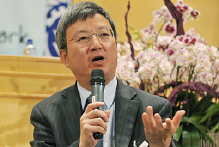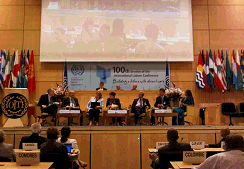
Typical street scene in Santa Ana, El Salvador. (Photo: iStock)
IMF Survey: The Tasks of Hercules: Jobs, Debt, and Social Justice
June 15, 2011
- Geneva panel looks at employment and social justice in globalized world
- Panel discussed measures needed to ensure economic growth translates into more jobs
- Another step in the cooperation between the IMF and the ILO
The debate over how to build an economic recovery that also creates jobs has increasingly become a discussion of the ways to achieve fiscal consolidation without losing sight of social justice, according to a group of experts at the ILO’s 100th International Labour Conference in Geneva.

The IMF’s Min Zhu told the conference that unemployment must be addressed (photo: IMF)
International labor
The panel brought together policymakers and officials with widely different perspectives, but all are struggling with the challenges of growth, jobs, and social concerns. The group included Min Zhu, Special Advisor to the IMF Managing Director; Samir Radwan, Egypt’s Finance Minister; Louka Katseli, Greece’s Labor Minister; Sharan Burrow, General Secretary of the International Trade Union Confederation (ITUC); Peter Clever, Director General of the Confederation of German Employers; and Jayati Ghosh, Professor of Economics at Jawaharlal Nehru University in India.
For countries still responding to the impact of the 2008 global financial crisis, the task of making fiscal adjustments needs to be balanced by other concerns, Zhu said. “Fiscal policy needs to be on a medium-term path,” he said. “It needs to address tax revenues, including through the closing of tax loopholes. At the same time, it is important to invest in healthcare, education, and other areas. We should make sure short-term unemployment does not expand to long-term unemployment.”
Speaking at the June 13 panel, convened by the International Labour Organization (ILO), Katseli said that countries now “all are in the same boat—developed, developing, and emerging markets. We face three challenges: fiscal consolidation, raising growth, and maintaining social justice. These are Herculean tasks.”

100th session of the ILO in Geneva (photo: IMF)
For the Egyptian government—facing the task of responding to the aspirations of a newly empowered populace—there is “a need for a paradigm shift,” said Radwan. “This is not just semantics, but necessity. Previously there was not enough attention paid to full employment.”
Joblessness in the Middle East, particularly among young people, is high. The latest Finance & Development magazine looks at the root causes of persistently high unemployment and how to improve job prospects in a region shaken by political change.
ILO statistics paint a grim picture of the current global employment situation with 210 million people out of work–the highest number in history; and over half of the global workforce in vulnerable employment. According to the ILO, in the next 10 years, more than 440 million new jobs will be needed to absorb new entrants into the labor force, and still more to reverse the unemployment caused by the recent crisis. While the world is seeing significant levels of economic growth in some countries, unemployment, particularly for young people, remains at record levels in many countries, posing enormous long term social and economic challenges including threats to social cohesion.
The panel represented another step in the effort to promote cooperation between the IMF and ILO, following the September 2010 joint Oslo Conference on Growth, Employment and Social Cohesion.
The September 2010 Oslo Conference—hosted by Prime Minister Jens Stoltenberg of Norway and co-sponsored by the IMF and ILO—brought together leaders from government, labor, business, and academia to tackle the sharp increase in unemployment and underemployment since the global financial crisis.
Oslo produced an agreement on collaboration between the two organizations, including:
• A focus on policies to promote employment-creating growth;
• Joint analytical work on social protection floor policies;
• And an agreement on the importance of social dialogue to build the consensus needed to tackle the adjustment challenges posed by the financial crisis.


